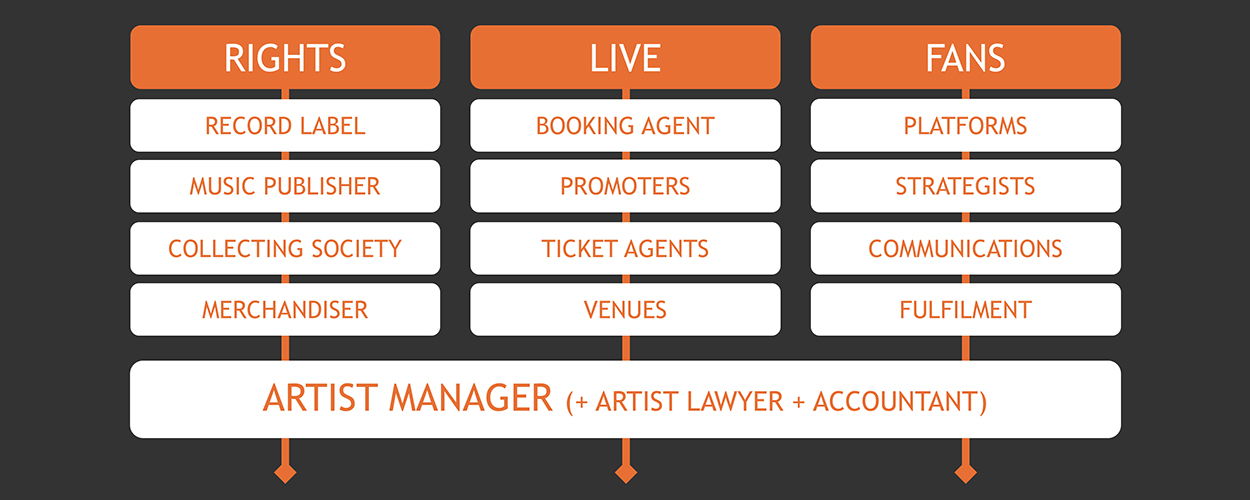CMU LIBRARY
The Music Industry
Resources about the wider music industry and how the different strands fit together

The music industry consists of people and companies that help music-makers – ie frontline artists, backing vocalists, session musicians, composers, songwriters, lyricists, beat-makers and studio producers – to make money out of their music making. It’s as simple as that.
ARTIST REVENUE STREAMS
For frontline artists – ie those artists who directly build brands and fanbases around their music – there are a number of different ways of making money.
That includes making money from streaming and other digital services; by selling CDs and vinyl; from royalties paid when music is broadcast or played in public; by licensing music to movies, games and ads; by selling merchandise; from touring and tickets; from brand partnership deals; and through selling products, content and experiences direct-to-fan.
We can organise all the different potential revenue streams into three main groups: intellectual property revenue streams, live performance revenue streams and fan relationship revenue streams.
ORGANISING THE MUSIC INDUSTRY
Most people and companies in the music industry specialise in and focus on one of a frontline artist’s revenue streams.
So some people primarily focus on intellectual property revenue streams, some on live performance revenue streams, and some on fan relationship revenue streams. Within the first group, people also usually focus on one kind of intellectual property – eg the copyright in songs, the copyright in recordings, or the copyright in visual works.
Therefore we can organise the music industry by revenue stream. We have the music rights industry, the live music sector and the direct-to-fan business. The music rights industry can be further split into the music publishing sector, the record industry and the merchandise business.
WHO WORKS WITH WHO
Most frontline artists will have multiple business partners at any one time, each one focused on a different revenue stream – eg a record label, a music publisher, a merchandiser, a booking agent, a promoter, and so on.
There are then other companies in the music industry that provide services to those business partners, like recording studios; music distributors; rights administrators; marketing, press, promotion and social agencies; ticket agents; tour and concert production companies; etc etc.
COLLECTING SOCIETIES
On the music rights side there are also the collecting societies that issue licences and collect royalties for artists, songwriters, record labels and music publishers in various different scenarios.
The collecting societies also perform other roles, in particular they manage the music industry’s main databases of songs and recordings. They also usually support their members and the wider music community through various educational, funding and lobbying initiatives.
The music industry has set up different collecting societies in each country. In the UK there are three societies, PRS and MCPS both work for songwiters and music publishers, PPL for artists and record labels.
ARTIST MANAGEMENT
The artist will also usually have a manager or management team – the one business partner focused on all aspects of the artist’s career.
The manager helps the artist to select and negotiate deals with the other business partners, to manage the ongoing relationships with those business partners, and to run the artist’s own company day-to-day.
Artists will also hire a lawyer to advise on deals and an accountant to manage the finances. The manager, lawyer and accountant then all work together to advise on and oversee the long term development of the artist’s business.
Guides and lectures from the CMU:DIY education programme…
This CMU:DIY Guide on Making Money From Music introduces the different ways that frontline artists make money from their music-making – and the music industry business partners they work with along the way.
Guides, reports and briefings from the CMU Insights consultancy unit…
The Music Copyright Explained guide from CMU Insights and the UK’s Intellectual Property Office provides a comprehensive beginner’s guide to how music copyright works and how music rights make money.
UK Music brings together organisations representing artists, musicians, songwriters, record producers, labels, publishers and managers in the UK.
LIVE brings together organisations representing everyone involved in live music including promoters, agents, venues and festivals.
LAST UPDATED: July 2022




